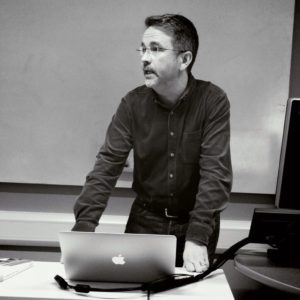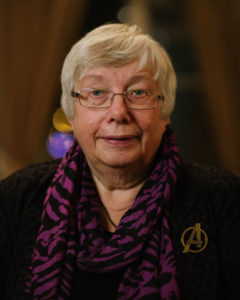Keynotes • Plenary Panelists • Program
Each year the Association of Internet Researchers brings individuals to our conference who focus on exciting and emerging areas of Internet research. We are very pleased for 2017 to present our members with two stirring keynote presentations by senior scholars in the field, and a plenary panel with four inspiring researchers.
Full #AoIR2017 Conference Program is downloadable here.
Keynote Speaker: Andrew Chadwick
 Andrew Chadwick (PhD, London School of Economics) is Professor of Political Communication in the Centre for Research in Communication and Culture and the Department of Social Sciences at Loughborough University. His latest book is The Hybrid Media System: Politics and Power (Oxford University Press, Second Edition, 2017), which was awared the 2016 International Journal of Press/Politics Book Award for an outstanding book on media and politics published in the previous ten years, and the American Political Science Association Information Technology and Politics Section Best Book Award, 2014. His book Internet Politics: States, Citizens, and New Communication Technologies (Oxford University Press, 2006) was awarded the American Sociological Association Best Book Award (Communication and Information Technologies Section) and is among the most widely-cited works in its field. Andrew is also Editor of the book series Oxford Studies in Digital Politics, which currently features 21 titles. He is currently writing his next book, Social Media and the Future of Democracy, for Oxford University Press. You can visit his website (www.andrewchadwick.com) and follow him on Twitter.
Andrew Chadwick (PhD, London School of Economics) is Professor of Political Communication in the Centre for Research in Communication and Culture and the Department of Social Sciences at Loughborough University. His latest book is The Hybrid Media System: Politics and Power (Oxford University Press, Second Edition, 2017), which was awared the 2016 International Journal of Press/Politics Book Award for an outstanding book on media and politics published in the previous ten years, and the American Political Science Association Information Technology and Politics Section Best Book Award, 2014. His book Internet Politics: States, Citizens, and New Communication Technologies (Oxford University Press, 2006) was awarded the American Sociological Association Best Book Award (Communication and Information Technologies Section) and is among the most widely-cited works in its field. Andrew is also Editor of the book series Oxford Studies in Digital Politics, which currently features 21 titles. He is currently writing his next book, Social Media and the Future of Democracy, for Oxford University Press. You can visit his website (www.andrewchadwick.com) and follow him on Twitter.
Keynote: Donald Trump, the 2016 U.S. Presidential Campaign, and the Intensification of the Hybrid Media System
The hybrid media system is built upon interactions among older and newer media logics—where logics are defined as bundles of technologies, genres, norms, behaviors, and organizational forms—in the reflexively connected social fields of media and politics. Actors in this system are articulated by complex and ever-evolving relationships based upon adaptation and interdependence and concentrations and diffusions of power. Actors create, tap, or steer information flows in ways that suit their goals and in ways that modify, enable, or disable the agency of others, across and between a range of older and newer media settings.
In this talk I develop and extend the hybrid media system framework in order to explain how mediation mattered in the extraordinary 2016 U.S. presidential campaign and the victory of Donald Trump. I show in detail how Trump proved adept at exploiting the power resources that the hybrid media system can provide. I also assess the significance of three developments that threaten to undermine liberal democratic norms: fake news, social media bot activity during televised debates, and the series of hacks and leaks that destabilized the media-politics elite and damaged Hillary Clinton. These constitute the hybrid media system’s dark frontier, for they could not exist without the incentive structures and media affordances that now shape so much political communication. And yet, despite such troubling trends, I also explain the significance of a major expression of resistance to Trump: the Women’s March during the presidential inauguration weekend of January 2017. I will end by reflecting on how the events of the last year are reshaping scholarship on the internet, politics, and society.
Keynote Speaker: Marju Lauristin
 Marju Lauristin is a Professor of Social Communication at the Institute of Social Studies at the University of Tartu (since 1995). Her main research interest covers social and cultural transformations on the way from post-communist to information society.
Marju Lauristin is a Professor of Social Communication at the Institute of Social Studies at the University of Tartu (since 1995). Her main research interest covers social and cultural transformations on the way from post-communist to information society.
Prof. Lauristin was one of the establishing members of ‘Rahvarinne’ in 1988, the first large-scale independent political movement in Estonia since the beginning of the Soviet occupation. She has since been Chair of the Estonian Social Democratic Party, deputy speaker of the Estonian parliament, and minister of Social Affairs of Estonia. Since 2014 she is a Member of European Parliament, where she is involved as a rapporteur in the area of data protection and development of European digital economy and society.
Keynote: Will algorithms kill deliberative democracy?
The current AoIR conference is taking place in a part of Europe where thirty years ago people, fighting for a ‘return to the West’, were ready to sacrifice their lives for freedom and democracy. Today we experience growing uncertainty concerning the resilience and validity of the basic liberal democratic principles of Western civilization.
Attacks on these principles we can hear every day in the media, as the influence of anti-democratic rhetoric is growing during election campaigns even in the traditional strongholds of Western democracy. Freedom of expression is seriously undermined by the proliferation of hate speech instead of critical discussion, and by the usage of algorithms for the manipulation of specific segments of media audiences, targeting them with ‘fake news’ and pre-cooked emotions. Debate on political matters is split between numerous ‘opinion bubbles’, and the public sphere in the networks is infected with political ‘memes’. These experiences are casting doubts on the perspective of ‘new deliberative digital democracy’ as envisaged in early studies of the new media. We can see how social media are multiplying political stereotypes and trivializing political discourse, instead of paving a way toward intelligent political deliberations, based on the principles of the habermasian ethics of democratic communication.
However, the dream to create a real ‘digital Agora’ as a platform for deliberative democracy, which could facilitate rational critical debate and feed political reflexivity on a local as well as global level, is not dead. Examples of using crowd-sourcing technology in order to create new platforms, bringing together mass participation and expert knowledge, are promising. But to make digital deliberative democracy effective for solving vital problems of contemporary societies, it would demand much more consolidated resources and huge common efforts from civil society and democratic institutions in all countries, in partnership with digital activists and ICT professionals. It should ensure freedom of choice and protect individuals from digital manipulation, implementing privacy protection by design. And last, but not least – it will call for radical reforms in the institutional structures of political decision-making, as well in civic education, in order to empower new generations of digital citizens.
Plenary Panel: Social media and digital activism – #powerful or #meaningless?
Adi Kuntsman’s  work explores formations and effects of violence in digital domains – its affective economy and its cultural imageries, its seductive power and its bargaining value. Adi’s work examined communal and political effects of living with violence as a perpetrator, a spectator, a bystander, or a complicit beneficiary. Recent publications include Selfie Citizenship; Digital Militarism: Israel’s Occupation in the Social Media Age (with Rebecca L. Stein), and Digital Cultures and the Politics of Emotion: Feelings, Affect and Technological Change (with Athina Karatzogianni).
work explores formations and effects of violence in digital domains – its affective economy and its cultural imageries, its seductive power and its bargaining value. Adi’s work examined communal and political effects of living with violence as a perpetrator, a spectator, a bystander, or a complicit beneficiary. Recent publications include Selfie Citizenship; Digital Militarism: Israel’s Occupation in the Social Media Age (with Rebecca L. Stein), and Digital Cultures and the Politics of Emotion: Feelings, Affect and Technological Change (with Athina Karatzogianni).
Kaarina Nikunen  is professor of Media and Communication Research at the University of Tampere. Her work explores the ways in which media structures, crafts and shapes participation and our roles as political subjects. Her recent research focuses on the refugee crisis and affectivity of migration debates. She has investigated formation and sensibilities of anti-immigrant movement as well as the emergence of new solidarity movements and refugee voice on social media. She is currently writing a book on media solidarities.
is professor of Media and Communication Research at the University of Tampere. Her work explores the ways in which media structures, crafts and shapes participation and our roles as political subjects. Her recent research focuses on the refugee crisis and affectivity of migration debates. She has investigated formation and sensibilities of anti-immigrant movement as well as the emergence of new solidarity movements and refugee voice on social media. She is currently writing a book on media solidarities.
Eugenia Siapera  is Deputy Director of the Institute for Future Media and Journalism, in Dublin City University. Eugenia is a Senior Lecturer at the School of Communications and researcher in the areas of social media, journalism, political theory, multiculturalism and cultural diversity and media. She is the author of Understanding New Media (Sage, second edition due 2017) and Global Media and Cultural Diversity (Wiley, 2010) and the co-editor of Radical Democracy and the Internet (with Lincoln Dahlberg, Palgrave 2007) and the Handbook of Global Online Journalism (with Andreas Veglis, Wiley, 2012). She is currently involved in two research projects, one examining racist hate speech in social media, and a second project tracing the changing patterns of media consumption through online streaming.
is Deputy Director of the Institute for Future Media and Journalism, in Dublin City University. Eugenia is a Senior Lecturer at the School of Communications and researcher in the areas of social media, journalism, political theory, multiculturalism and cultural diversity and media. She is the author of Understanding New Media (Sage, second edition due 2017) and Global Media and Cultural Diversity (Wiley, 2010) and the co-editor of Radical Democracy and the Internet (with Lincoln Dahlberg, Palgrave 2007) and the Handbook of Global Online Journalism (with Andreas Veglis, Wiley, 2012). She is currently involved in two research projects, one examining racist hate speech in social media, and a second project tracing the changing patterns of media consumption through online streaming.
 Cindy Tekobbe is an Assistant Professor of Composition, Rhetorics and English Studies at The University of Alabama. Her research interests include rhetorics of gender identities and sexualities, feminisms, cultures, networks and technologies, indigeneities and survivance, and the literacy and cultural practices of digital communities. She is a managing editor of constellations: a cultural publishing space and is affiliated research faculty at Michigan State University’s Writing, Information, and Digital Experience (WIDE) research center.
Cindy Tekobbe is an Assistant Professor of Composition, Rhetorics and English Studies at The University of Alabama. Her research interests include rhetorics of gender identities and sexualities, feminisms, cultures, networks and technologies, indigeneities and survivance, and the literacy and cultural practices of digital communities. She is a managing editor of constellations: a cultural publishing space and is affiliated research faculty at Michigan State University’s Writing, Information, and Digital Experience (WIDE) research center.
Cindy is a career software developer and project manager, specializing in enterprise financial applications and web platforms.


